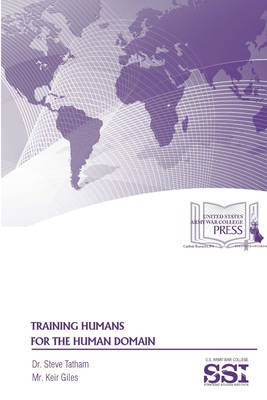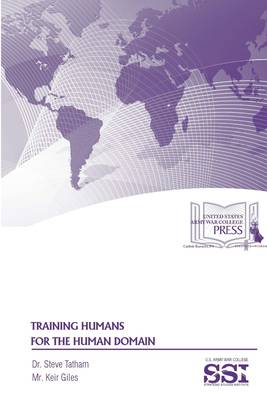
- Afhalen na 1 uur in een winkel met voorraad
- Gratis thuislevering in België vanaf € 30
- Ruim aanbod met 7 miljoen producten
- Afhalen na 1 uur in een winkel met voorraad
- Gratis thuislevering in België vanaf € 30
- Ruim aanbod met 7 miljoen producten
Zoeken
Training Humans for The Human Domain
Steve Tatham, Keir Giles, Strategic Studies Institute
Paperback | Engels
€ 21,45
+ 42 punten
Omschrijving
In this timely monograph, British authors Mr. Keir Giles and Dr. Steve Tatham fuse key lessons from two disparate theaters to argue persuasively for greater education of Army personnel in human terrain disciplines. Dr. Tatham, an expert in strategic communications and influence operations with extensive experience in Iraq and Afghanistan, and Mr. Giles, a long-term scholar of Russian military and political decisionmaking processes, both contribute a wealth of accessible examples and anecdotes to argue their case for greater investment in human domain skills, both as an insurance against future conflict and in order to prevail in that conflict should it be joined. Drawing on a range of sources across social science and linguistics, they make the crucial point that both commanders and junior personnel must be not only prepared but also educated to set aside their cultural, social, and even linguistic preconceptions in order to accurately assess the options open to an adversary.
Specificaties
Betrokkenen
- Auteur(s):
- Uitgeverij:
Inhoud
- Aantal bladzijden:
- 58
- Taal:
- Engels
Eigenschappen
- Productcode (EAN):
- 9781329784352
- Verschijningsdatum:
- 23/12/2015
- Uitvoering:
- Paperback
- Formaat:
- Trade paperback (VS)
- Afmetingen:
- 152 mm x 229 mm
- Gewicht:
- 99 g

Alleen bij Standaard Boekhandel
+ 42 punten op je klantenkaart van Standaard Boekhandel
Beoordelingen
We publiceren alleen reviews die voldoen aan de voorwaarden voor reviews. Bekijk onze voorwaarden voor reviews.











